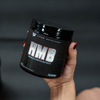With all the choices of protein powders on the market today, it can be confusing where to start when choosing a protein powder.
The majority of your calories from the day should come from whole foods and proteins from lean meats like beef, chicken, fish, eggs, and yogurt. The recommended protein consumption of 1-1.2 g per pound of bodyweight daily can make it difficult to ensure you’re consistently hitting your protein goal for the day. This is where supplementing with a high-quality protein powder comes into play.
It’s crucial to inspect the label for ingredients, serving sizes, protein to serving ratio, and third-party testing when choosing a protein powder.
Whey concentrate and isolate are both popular protein choices. Derived from milk, whey concentrate and isolate are considered complete forms of protein, meaning they contain all nine essential amino acids necessary for muscle growth.
Whey comes from the liquid byproduct made during cheese production, offering a high protein-to-serving ratio with minimal carbs and fats. Whey concentrate protein content can vary in yield (25-89%), while isolate undergoes extra processing, containing at least 90% protein.
Whey isolate is simply whey concentrate that has been further processed and filtered to create a more “pure” form of protein. It contains the essential amino acids necessary for muscle growth and yields a higher protein ratio than whey concentrate. With little to no lactose, isolate the most bioavailable protein powder and can be easily digested, even by those intolerant to lactose. Titan Isolate™ in particular has a whopping 24 grams of protein per 24-27 gram serving. We take pride not only in the ingredients themselves, but what we don’t add to our formula. Titan Isolate™ contains only add microfiltered whey isolate, digestive enzymes, and are naturally sweetened with Splenda. Our formulas contain no erythritol and no artificial colors or dyes ever.
The longer processing time is why isolate tends to be more expensive than concentrate. However, this doesn’t mean that isolate is superior in every way to its lower-processed counterpart.
Whey concentrate will contain slightly more carbohydrates and fats than its micro filtered by-product. Titan Whey™ consists of low-temperature processed whey protein concentrate, cross-flow microfiltration whey protein isolate, and milk protein isolates. Concentrate, with its higher macronutrient profile, retains all the good stuff found in whole milk, without the added sugars, lactose, and saturated fat. These essential amino acids and additional vitamins and minerals in whey make it incredibly beneficial for building and repairing muscles. Whey concentrate increases immunoglobulin antibodies, boosting your immune system and gut health. It also plays an important role in activating muscle protein synthesis due to its high levels of leucine, an amino acid crucial for stimulating muscle growth. Leucine has also been proven to improve blood sugar levels and lower blood pressure.
If you are sensitive to lactose or require minimal carbs and fats due to your diet, isolate will be your best choice when choosing a whey protein powder. Personal preferences can also come into play as some individuals may favor the slightly richer taste and texture of Whey™ while others appreciate the clean profile of Isolate™. Ultimately, the decision is up to your own personal preference in terms of taste, cost, and dietary restrictions.
 Log in
Log in






